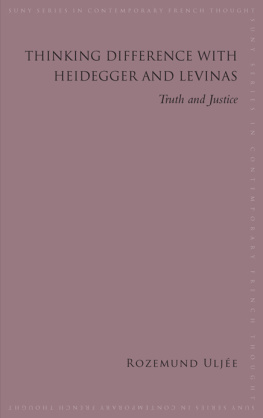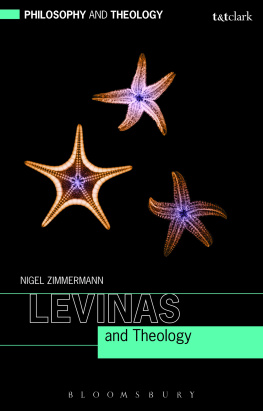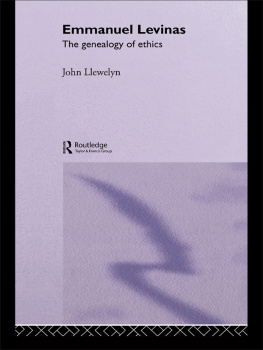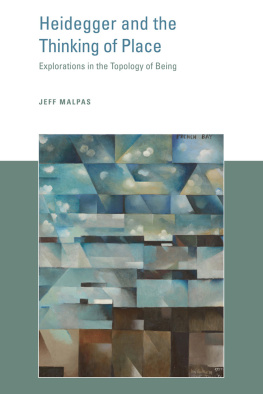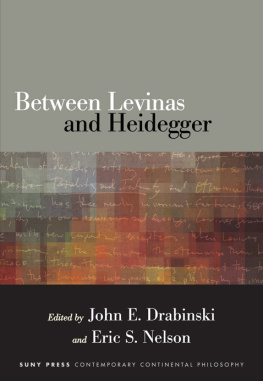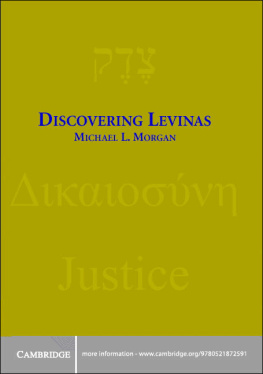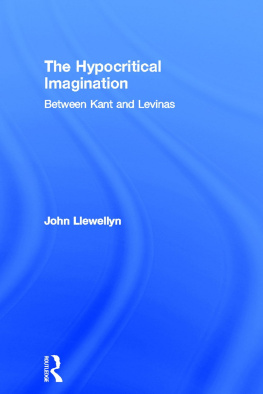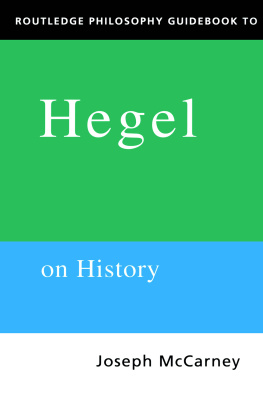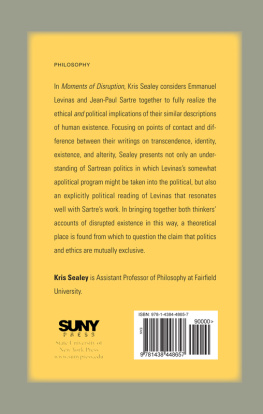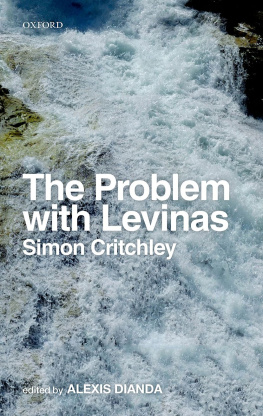Rozemund Ulje - Thinking Difference with Heidegger and Levinas
Here you can read online Rozemund Ulje - Thinking Difference with Heidegger and Levinas full text of the book (entire story) in english for free. Download pdf and epub, get meaning, cover and reviews about this ebook. year: 2020, publisher: State University of New York Press, genre: Religion. Description of the work, (preface) as well as reviews are available. Best literature library LitArk.com created for fans of good reading and offers a wide selection of genres:
Romance novel
Science fiction
Adventure
Detective
Science
History
Home and family
Prose
Art
Politics
Computer
Non-fiction
Religion
Business
Children
Humor
Choose a favorite category and find really read worthwhile books. Enjoy immersion in the world of imagination, feel the emotions of the characters or learn something new for yourself, make an fascinating discovery.
- Book:Thinking Difference with Heidegger and Levinas
- Author:
- Publisher:State University of New York Press
- Genre:
- Year:2020
- Rating:3 / 5
- Favourites:Add to favourites
- Your mark:
- 60
- 1
- 2
- 3
- 4
- 5
Thinking Difference with Heidegger and Levinas: summary, description and annotation
We offer to read an annotation, description, summary or preface (depends on what the author of the book "Thinking Difference with Heidegger and Levinas" wrote himself). If you haven't found the necessary information about the book — write in the comments, we will try to find it.
Thinking Difference with Heidegger and Levinas — read online for free the complete book (whole text) full work
Below is the text of the book, divided by pages. System saving the place of the last page read, allows you to conveniently read the book "Thinking Difference with Heidegger and Levinas" online for free, without having to search again every time where you left off. Put a bookmark, and you can go to the page where you finished reading at any time.
Font size:
Interval:
Bookmark:

THINKING DIFFERENCE WITH
HEIDEGGER AND LEVINAS
SUNY series in Contemporary French Thought
David Pettigrew and Franois Raffoul, editors
THINKING DIFFERENCE WITH
HEIDEGGER AND LEVINAS
Truth and Justice
ROZEMUND ULJE

Published by State University of New York Press, Albany
2020 State University of New York
All rights reserved
Printed in the United States of America
No part of this book may be used or reproduced in any manner whatsoever without written permission. No part of this book may be stored in a retrieval system or transmitted in any form or by any means including electronic, electrostatic, magnetic tape, mechanical, photocopying, recording, or otherwise without the prior permission in writing of the publisher.
For information, contact State University of New York Press, Albany, NY
www.sunypress.edu
Library of Congress Cataloging-in-Publication Data
Names: Ulje, Rozemund, author.
Title: Thinking difference with Heidegger and Levinas : truth and justice / Rozemund Ulje.
Description: Albany : State University of New York Press, 2020. | Series: SUNY series in contemporary French thought | Includes bibliographical references and index.
Identifiers: LCCN 2019036170 | ISBN 9781438478814 (hardcover : alk. paper) | ISBN 9781438478821 (ebook)
Subjects: LCSH: Heidegger, Martin, 18891976. | Lvinas, Emmanuel.
Classification: LCC B3279.H49 U45 2020 | DDC 193dc23
LC record available at https://lccn.loc.gov/2019036170
10 9 8 7 6 5 4 3 2 1
CONTENTS
ACKNOWLEDGMENTS
Sections of chapters 1 and 6 have been published as parts of Hegel and Levinas: On Truth and the Question of Interruption, Hegel Bulletin 39, no. 2: 22135. Sections of chapters 4 and 6 have been published as parts of Metaphysics and Its Other, in Heidegger, Levinas, and Derrida: The Question of Difference , edited by L. Foran and R. Ulje (Dordrecht: Springer, 2016). I am grateful to the publishers for their permission to reprint the material in this book.
The research for and the writing of this book have taken place over a significant amount of time and in a number of different institutions. Part this work was completed at the Archives Husserl in Paris; I am grateful to Marc Crpon and Jocelyn Benoist for their warm welcome. Furthermore, I would like to thank everyone at the School of Philosophy, University College Dublin, especially Timothy Mooney and Dermot Moran, who read and commented on draft versions of this work. I am also thankful to Joseph Cohen, who has opened up a world in which philosophy becomes a gesture of and a dedication to responsibility. Moreover, I would like to thank my colleagues at the Institute for Philosophy, Leiden University, where I feel truly at home. I also wish to thank Andrew Kenyon at SUNY Press for his help. Thank you, Werner, Saskia, Willem, Robbert, Ijsbrand, Tertia for your love and trust. Jullie zijn het fundament . Finally, I wish to thank Gertjan, who, with a smile, makes me remember what matters.
ABBREVIATIONS
| AQE | Emmanuel Levinas, Autrement qutre ou au-del lessence (Den Haag: 1974). Translated by Alphonso Lingis as Otherwise than Being: or Beyond Essence (Pittsburgh: 1981). |
| BH | Martin Heidegger, Brief ber den Humanismus (1946) (Frankfurt am Main: 1976). Translated by Frank A. Capuzzi, J. Glenn Gray, and David Farrell Krell as Letter on Humanism, in Basic Writings (New York: 1977). |
| DWS | Martin Heidegger, Der Weg zur Sprache, in Unterwegs zur Sprache (Frankfurt am Main: 1985). Translated by David Farrell Krell as The Way to Language, in Basic Writings (New York: 1977). |
| EE | Emmanuel Levinas, De lexistence lexistant (Paris: 1947). Translated by Alphonso Lingis as Existence and Existents (Pittsburgh: 1978). |
| ID | Martin Heidegger, Identitt und Differenz (1957) (Frankfurt am Main: 2006). Translated by Joan Stambaugh as Identity and Difference (Chicago: 2002). |
| NM | Martin Heidegger, Nietzsches Metaphysik (194142) (Frankfurt am Main: 1990). Translated by David Farrell Krell, as Martin Heidegger: Nietzsche Vol. III The Will to Power as Knowledge and as Metaphysics (San Francisco: 1982). |
| NLWM | Martin Heidegger, Nietzsches Lehre vom Willen Zur Macht (1939) (Frankfurt am Main: 1989). Translated by David Farrell Krell as Martin Heidegger: Nietzsche Vol. III. The Will to Power as Knowledge and as Metaphysics (San Francisco: 1982). |
| PG | G. W. F. Hegel, Phnomenologie des Geistes (1807) (Frankfurt am Main: 1986). Translated by A. V. Miller as Hegels Phenomenology of Spirit (Oxford: 1977). |
| SA | Martin Heidegger, Der Spruch des Anaximander (1946) (Frankfurt am Main: 1977). Translated by David Farrell Krell and Frank A. Capuzzi as The Anaximander Fragment, in Early Greek Thinking (New York: 1975). |
| SZ | Martin Heidegger, Sein und Zeit (Tbingen: 1927). Translated by John Macquarrie and Edward Robinson as Being and Time (Oxford: 1962). |
| TA | Emmanuel Levinas, La trace de lautre, in En dcouvrant lexistence avec Husserl et Heidegger (Paris: 1967). Translated by Alphonso Lingis as Trace of the Other, in Tijdschrift voor Filosofie (September 1963). |
| TI | Emmanuel Levinas, Totalit et infini (The Hague: 1961). Translated by Alphonso Lingis as Totality and Infinity (Pittsburgh: 1969). |
| WHD | Martin Heidegger, Wass Heisst Denken? (195152) (Frankfurt am Main: 2002). Translated by J. Glenn Gray as What Is Called Thinking? (New York: 1976). |
| ZS | Martin Heidegger, Zeit und Sein (1962) (Frankfurt am Main: 2007). Translated by Joan Stambaugh as On Time and Being (Chicago: 2002). |
INTRODUCTION
It is possible to say, perhaps, that the defining aspect of the history of philosophy is thinking truth in terms of the intelligibility of the presence of Being. This intelligibility would be capable of comprehending truth as that which is present, as that which can be disclosed and that of which it is possible to synchronize into a whole. The equation of truth with presence assumes that however different terms of a relation might appear and however dispersed over time they might seem, in the end, they are rendered commensurate; an expression of unity.
Georg Wilhelm Friedrich Hegel could be named as the representative of the concern with the deployment of truth as a comprehension of that which is present. Hegel claims that philosophys entire history is to be thought as the development of truth. He writes in the Phnomenologie des Geistes : The true is the whole. But the whole is nothing other than the essence consummating itself through its development. It means for Hegel that truth is the movement of reason, which is the history of philosophy itself. For Hegel, thus, there is an intrinsic relation between the history of philosophy and philosophy. This relation implies that different philosophical systems throughout history can be read as the progressive unfolding of truth, since they are moments in its realization.
Hegel suggests that the movement of reason manifests itself both in and as difference. is able to grasp or comprehend the movement of differentiation by revealing itself as the identity of different entities. According to Hegel, the task of philosophy is to gather and recollect the essence of the truth of Being, which means nothing other than as the foundation from which difference can arise. This essence, manifesting itself as difference, is the foundation for thinking, because thinking can think the recognition of difference as identity and simultaneously identity as difference. Since thinking is capable of recognizing identity in difference and difference in identity, there is never an alterity that remains outside the movement of thinking, as any alterity is comprehended within this movement itself.
Font size:
Interval:
Bookmark:
Similar books «Thinking Difference with Heidegger and Levinas»
Look at similar books to Thinking Difference with Heidegger and Levinas. We have selected literature similar in name and meaning in the hope of providing readers with more options to find new, interesting, not yet read works.
Discussion, reviews of the book Thinking Difference with Heidegger and Levinas and just readers' own opinions. Leave your comments, write what you think about the work, its meaning or the main characters. Specify what exactly you liked and what you didn't like, and why you think so.

